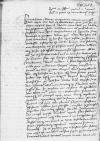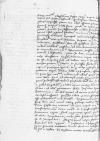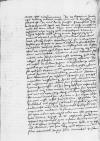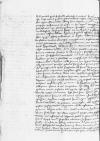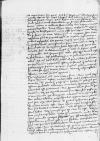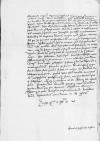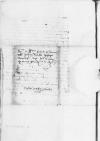Dedi nuper ad te ⌊⌋ ex ⌊Harderwico⌋, quas haud scio, an adhuc receperis, nam ad ⌊Theodoricum⌋ tuum, qui ⌊Vollenhoae⌋ substiterat, perferri debebant cum iis, quas ad te scripturus erat illustris ⌊Maximilianus ab Egmonda⌋ comes Burensis et Yselstein. Verum cum orig. quum⌈cumcum orig. quum⌉ eodem die idem ⌊comes⌋ inter venandum ex haustu aquae insolito in febrim incidisset, postergata est mentio litterarum ad te scribendarum. Receperat enim se propria manu scribere velle atque in hoc ipso officium amanuensis aspernari. Ab eo autem die, etsi lectica vectus, nos in ⌊arce sua Burensi⌋, quae in ⌊Batavia⌋ sita est, benigne hospitaliterque susceperit et on the margin⌈etet on the margin⌉ tractaverit, tamen nondum a febre desertus fuit, credo, quia medicorum praeceptis obsequi recusavit. Quare ne tunc quidem tempus illius interpellandi fuit atque haud scio, an in hunc usque diem fuerit, quandoquidem ego postquam cum serenissima ⌊regina⌋ ⌊Bruxellas⌋ reversus sum, qui dies fuit tertio Kalendas Augusti, vix dum ordinatis rebus meis vocataque ex ⌊Flandria⌋ ⌊uxore⌋ iussus sum in ⌊Angliam⌋ me conferre ad persuadendam huic ⌊regiae maiestati⌋ pacem cum ⌊Christianissimo Francorum⌋. ⌊Utriusque enim principis⌋ copiae terra marique augebantur cotidie orig. quotidie⌈cotidiecotidie orig. quotidie⌉ apparebatque illos de summa rerum periculum facturos, id quod citra plurimam sanguinis Christiani effusionem accidere haud potuisset nec satis expedivisset reipublicae satis undique afflictae.
Proinde decima octava orig. decimaoctava⌈decima octavadecima octava orig. decimaoctava⌉ die mensis Augusti ⌊Londinum⌋ appuli satis felici orig. foelice⌈felicifelici orig. foelice⌉ usus navigatione neque ulla navi a me conspecta, cum orig. quum⌈cumcum orig. quum⌉ classis utraque non procul a ⌊Vecti insula⌋ in ancoris orig. anchoris⌈ancorisancoris orig. anchoris⌉ staret praestolareturque opportunam occasionem fortunae tentandae. Et ea quidem, quae Christianissimi ⌊Francorum regis⌋ est, navibus constat supra quadringentis triremes habens iunctas viginti et octo. Huius autem
 UUB, H. 155, f. 109v
⌊regiae maiestatis⌋ classis non supra centum viginti habet naves, sed instructissimas, quibuscum triremes Gallicae congressae parum aut nihil efficere potuere, quamquam tempus nactae sunt, quale ne optari quidem potuit, quando hoc sesquimense nullus fuit in mari hidden by binding⌈[ri]ri hidden by binding⌉ ventus, sed perpetua quaedam orig. quedam⌈quaedamquaedam orig. quedam⌉ malacia triremibus similibusque actuariis navigiis accommodatissima.
UUB, H. 155, f. 109v
⌊regiae maiestatis⌋ classis non supra centum viginti habet naves, sed instructissimas, quibuscum triremes Gallicae congressae parum aut nihil efficere potuere, quamquam tempus nactae sunt, quale ne optari quidem potuit, quando hoc sesquimense nullus fuit in mari hidden by binding⌈[ri]ri hidden by binding⌉ ventus, sed perpetua quaedam orig. quedam⌈quaedamquaedam orig. quedam⌉ malacia triremibus similibusque actuariis navigiis accommodatissima.
⌊Londini⌋ vero cum orig. quum⌈cumcum orig. quum⌉ praefatam ⌊regiam maiestatem⌋ non invenirem, profectus sum ad ⌊Gylfort⌋, locum non multis milibus passuum ab ⌊Hamtoncourte⌋ (ubi te aliquando cum ⌊Cardinali Eboracensi⌋ fuisse audire memini) distantem. Quo in loco mandatorum mihi commissorum exponendorum copia mihi facta est singulaque sunt ab eadem ⌊maiestate⌋ in optimam accepta partem. Ceterum orig. Caeterum⌈CeterumCeterum orig. Caeterum⌉ et successus felices orig. foelices⌈felicesfelices orig. foelices⌉ huius ⌊regni⌋, et propinqua hiems orig. hyems⌈hiemshiems orig. hyems⌉, et quod vulgo persuasum sit ⌊Gallorum regem⌋ diutino bello exhaustum, efficiunt, ut prior ⌊haec maiestas⌋ condiciones orig. conditiones⌈condicionescondiciones orig. conditiones⌉ ullas pacis propo hidden by binding⌈[o]o hidden by binding⌉nere no written over ve⌈venono written over ve⌉lit, quas ab adversa parte (siquidem illa pacis studiosa esse volet) proficisci debere ait, se etenim hidden by binding⌈[nim]nim hidden by binding⌉ a ⌊Gallis⌋ impetitum ms. impetitans(!)
⌈impetitumimpetitum ms. impetitans(!)
⌉, ab illis arma contra ⌊Boloniam⌋ illata, ab illis pertentatam bello insulam hanc Britanniam, ab illis excitos ad arma ⌊Scotos⌋, quamquam hidden by binding⌈[uam]uam hidden by binding⌉ adversis auspiciis.
Proinde video parum spei positum esse in legationis meae successu, experiar tamen, si forte Deus alium animum ⌊utrique principi⌋ indere dignetur hidden by binding⌈[ur]ur hidden by binding⌉, nam ⌊caesar⌋ non contentus ad hanc ⌊regiam maiestatem⌋ me hidden by binding⌈[me(?)]me hidden by binding⌉ transmittere, ⌊alium⌋ etiam misit ad Christianissimum ⌊Francorum regem⌋ simili argumento usurum. Quid ⌊is⌋ ab ⌊eodem⌋ impetravit, mihi sane hactenus ignotum est et incognitum.
Atque ut ⌊huius regni⌋ statum brevibus tibi exponam: ⌊Eustacius Chapuysius⌋, quem ⌊Granatae⌋ oratorem ⌊ducis Borbonii⌋ vidisti atque, ut scis, a ⌊caesare⌋ in ⌊Angliam⌋ orator transmissus est  UUB, H. 155, f. 110r anno XV-c vicesimo nono, in ea legatione hactenus egit aetatemque orig. etatemque⌈aetatemqueaetatemque orig. etatemque⌉ contrivit omnem, nec nisi a bimestri ea solutus est. In ⌊cuius⌋ locum successit ⌊Franciscus Dilfus⌋ Andtwerpianus eques, vir doctus et mihi amicissimus, credo tibi etiam notus, nam anno vicesimo octavo in ⌊Hispanias⌋ venit vixitque apud ⌊archiepiscopum Toletanum⌋ linguae discendae causa, fuitque in aula frequens atque apud primores cumprimis gratiosus, commendatus praeter alias dotes plerisque ⌊Erasmi Roterodami⌋ litteris. ⌊Cui⌋ et convixerat ⌊Basileae⌋, quo tempore et ⌊Ioannes Laskus⌋ et nonnulli vestrates eruditionis Erasmicae studio eo confluxerant.[1]
UUB, H. 155, f. 110r anno XV-c vicesimo nono, in ea legatione hactenus egit aetatemque orig. etatemque⌈aetatemqueaetatemque orig. etatemque⌉ contrivit omnem, nec nisi a bimestri ea solutus est. In ⌊cuius⌋ locum successit ⌊Franciscus Dilfus⌋ Andtwerpianus eques, vir doctus et mihi amicissimus, credo tibi etiam notus, nam anno vicesimo octavo in ⌊Hispanias⌋ venit vixitque apud ⌊archiepiscopum Toletanum⌋ linguae discendae causa, fuitque in aula frequens atque apud primores cumprimis gratiosus, commendatus praeter alias dotes plerisque ⌊Erasmi Roterodami⌋ litteris. ⌊Cui⌋ et convixerat ⌊Basileae⌋, quo tempore et ⌊Ioannes Laskus⌋ et nonnulli vestrates eruditionis Erasmicae studio eo confluxerant.[1]
At ⌊Eustachius⌋ toto corpore aeger, lingua tantum memoriaque atque eruditione memorabilis, ⌊Lovanium⌋ ad otium orig. ocium⌈otiumotium orig. ocium⌉ litterarium sese contulit aula sibi sua habere iussa statuitque, quod vitae reliquum est seorsum a curis molestiisque absumere. ⌊Dylfus⌋ autem noster et candore ingenii, et dexteritate in rebus agendis, ut qui consulatum bis ⌊Andtwerpiae⌋ gessit, plurimam sibi apud hanc ⌊regiam maiestatem⌋ gratiam, apud primores aulicos favorem benevolentiamque conciliavit, adeo ut brevi obliteraturus sit desiderium orig. desyderium⌈desideriumdesiderium orig. desyderium⌉ ⌊Chapuisii⌋, qui pro temporis magnitudine vicissitudineque, quo hic egit, non potuit non sibi negotiorum orig. negociorum⌈negotiorumnegotiorum orig. negociorum⌉, quae alicuius sunt ponderis, omnimodam notitiam orig. noticiam⌈notitiamnotitiam orig. noticiam⌉ comparavisse. Ab hoc itaque ⌊Dylfo⌋ pro nostra plusquam fraterna eaque veteri amicitia benignissime sum exceptus, cum orig. quum⌈cumcum orig. quum⌉ ruri ⌊rex⌋ agat egoque ultra, quam orig. ultraquam⌈ultra, quamultra, quam orig. ultraquam⌉ principio exspectaveram, hic morari coactus sim.
An vero in ⌊hoc regno⌋ adhuc sint, quos nosse possis, haud satis scio. Est quidem in Borealibus oris superstes ⌊Cutbertus Tunstallus⌋ quondam Londiniensis, nunc autem Dulmonensis[2] episcopus, vir magna aetate, eruditione et sanctimonia vitae venerabilis paper damaged⌈[s]s paper damaged⌉, sed extra aulam agit neque, ut audio, cum illa quicquam habet commercii. Superest et dominus ⌊Stephanus Gardtnerus⌋ episcopus Wynthoniensis, quem, ni fallor, ⌊Bononiae⌋ convenisti ex urbe ⌊Roma orig. Rhoma⌈RomaRoma orig. Rhoma⌉⌋ reversum, quo tempore ⌊caesar⌋ eo ex ⌊Hispaniis⌋ advenerat, vir pius atque apud ⌊regiam maiestatem⌋ summae auctoritatis orig. autoritatis⌈auctoritatisauctoritatis orig. autoritatis⌉. In quo praeter admirabilem in sacris hidden by binding⌈[s]s hidden by binding⌉
 UUB, H. 155, f. 110v
litteris peritiam, quam abunde orig. habunde⌈abundeabunde orig. habunde⌉ adversus ⌊Martinum Bucerum⌋ ⌊⌋, inest mirus quidam zelus veteris nostrae religionis in ⌊hoc regno⌋ observandae adeoque hanc ⌊regiam maiestatem⌋ in hoc proposito confirmavit, ut nulla in hoc regnum irrepserit Zwingliana aut Oecolampadiana haeresis orig. heresis⌈haeresishaeresis orig. heresis⌉, multoque minus anababtistica, et si quis forte ea contagione infectus sit, is citra misericordiam extremo supplicio afficitur. Prudenter hidden by binding⌈[er]er hidden by binding⌉ sane, ex quo praefatae traditiones in id solum videantur inventae, ut plebem arment adversus magistratus, superioritates omnes subvertant quandamque orig. quamdamque⌈quandamquequandamque orig. quamdamque⌉ inducant non tamen duraturam aequalitatem. Adeo ut hic in caeremoniis orig. ceremoniis⌈caeremoniiscaeremoniis orig. ceremoniis⌉ ecclesiae nihil mutatum videas: fiunt sacra, preces matutinae, diurnae, nocturnae, serotinae, ut ab antiquo, processiones crebrius quam antea, confessiones accuratiores, nec licet ad communionem cuiquam accedere, qui non a sacerdote, cui confessus sit, litteras afferat orig. adferat⌈afferatafferat orig. adferat⌉ testimoniales, tantum nulli sunt in hoc regno monachi neque Romanus orig. Rhomanus⌈RomanusRomanus orig. Rhomanus⌉ pontifex pluris fit quam alius quivis praesul. In processionibus etiam supplicationes fiunt lingua patria. Haud sane negaverim quosdam esse, qui de religione aliter sentire mallent, etiam inter episcopos, quique, si auderent, non abhorrerent ms. abherrerent(!)
⌈abhorrerentabhorrerent ms. abherrerent(!)
⌉ ab alieno dogmate, verum ii auctoritatem orig. autoritatem⌈auctoritatemauctoritatem orig. autoritatem⌉ regiam nec sine causa verentur neque cristas ullo modo erigere consultum sibi putant. Et hactenus quidem de religione, prout a me compertum est, deque iis viris, quorum nomen et fama tibi cognita esse potuere.
UUB, H. 155, f. 110v
litteris peritiam, quam abunde orig. habunde⌈abundeabunde orig. habunde⌉ adversus ⌊Martinum Bucerum⌋ ⌊⌋, inest mirus quidam zelus veteris nostrae religionis in ⌊hoc regno⌋ observandae adeoque hanc ⌊regiam maiestatem⌋ in hoc proposito confirmavit, ut nulla in hoc regnum irrepserit Zwingliana aut Oecolampadiana haeresis orig. heresis⌈haeresishaeresis orig. heresis⌉, multoque minus anababtistica, et si quis forte ea contagione infectus sit, is citra misericordiam extremo supplicio afficitur. Prudenter hidden by binding⌈[er]er hidden by binding⌉ sane, ex quo praefatae traditiones in id solum videantur inventae, ut plebem arment adversus magistratus, superioritates omnes subvertant quandamque orig. quamdamque⌈quandamquequandamque orig. quamdamque⌉ inducant non tamen duraturam aequalitatem. Adeo ut hic in caeremoniis orig. ceremoniis⌈caeremoniiscaeremoniis orig. ceremoniis⌉ ecclesiae nihil mutatum videas: fiunt sacra, preces matutinae, diurnae, nocturnae, serotinae, ut ab antiquo, processiones crebrius quam antea, confessiones accuratiores, nec licet ad communionem cuiquam accedere, qui non a sacerdote, cui confessus sit, litteras afferat orig. adferat⌈afferatafferat orig. adferat⌉ testimoniales, tantum nulli sunt in hoc regno monachi neque Romanus orig. Rhomanus⌈RomanusRomanus orig. Rhomanus⌉ pontifex pluris fit quam alius quivis praesul. In processionibus etiam supplicationes fiunt lingua patria. Haud sane negaverim quosdam esse, qui de religione aliter sentire mallent, etiam inter episcopos, quique, si auderent, non abhorrerent ms. abherrerent(!)
⌈abhorrerentabhorrerent ms. abherrerent(!)
⌉ ab alieno dogmate, verum ii auctoritatem orig. autoritatem⌈auctoritatemauctoritatem orig. autoritatem⌉ regiam nec sine causa verentur neque cristas ullo modo erigere consultum sibi putant. Et hactenus quidem de religione, prout a me compertum est, deque iis viris, quorum nomen et fama tibi cognita esse potuere.
Quae vero de ⌊Scotis⌋ nuntiantur orig. nunciantur⌈nuntianturnuntiantur orig. nunciantur⌉, haec fere sunt: gentem eam instigantibus ⌊Francis⌋ ad arma excitam finibusque suis egressam, vixdum conspectis ⌊huius regni⌋ praesidiis ad limites collocatis, in ⌊patriam⌋ revertisse, ab ⌊Anglis⌋ postea insequentibus aliquanta clade affectam. ⌊Francos⌋, quorum aliquot milia cum ⌊Scotis⌋ militant, haud maiore cum felicitate orig. foelicitate⌈felicitatefelicitate orig. foelicitate⌉ in altera regionis parte rem gessisse, male enim affectos ab ⌊Hispanis⌋, ⌊Italis⌋ et ⌊Germanis⌋,[3] qui huius ⌊regiae maiestatis⌋ stipendio aluntur, in fugam coniectos fuisse. Quo fieri, ut plerique arbitrentur de pace quoque inter duos istos populos ⌊Anglum⌋ ⌊Scotum⌋que brevi tractatum iri aut nunc tractari, nam ex ⌊Scotia⌋ oratores advenisse nos ipsi vidimus, incerti tamen, quibus de causis, fieri enim potest, ut ex
 UUB, H. 155, f. 111r
ea ⌊regni Scotici⌋ sint parte, quae ⌊huic regiae maiestati⌋ devotione iuramentoque obstricta est.
UUB, H. 155, f. 111r
ea ⌊regni Scotici⌋ sint parte, quae ⌊huic regiae maiestati⌋ devotione iuramentoque obstricta est.
Etenim
cf. Caes. Gal. 1.1 Gallia est omnis divisa in partes tres ⌊⌊regnum illud Scotorum⌋ in tres est divisum partescf. Caes. Gal. 1.1 Gallia est omnis divisa in partes tres ⌋: unam habet ⌊regina vidua⌋ cum ⌊filiola⌋,[4] cui adhaeret orig. adheret⌈adhaeretadhaeret orig. adheret⌉ ⌊Iacobus comes ab Hameltoun⌋, qui se regni gubernatorem vocat,[5] altera a ⌊cardinali Sancti Andreae⌋, viro magnae in ⌊eo regno⌋ potentiae dependet, tertia ad hanc ⌊regiam Angliae maiestatem⌋ respicit. Quo fit, ut divisa potentia minus possit ⌊huic regno⌋ nocere. Accedit, quod ⌊Franci⌋, qui circa ⌊Vectim⌋ sunt, in magnam spem ⌊Scotos⌋ erexerant fore, ut ingentes copias in ⌊Angliam⌋ exponerent, quibus resistendis tota potentia insulae opus foret. Verum magnificae huiusmodi promissiones in fumum evanuerunt neque a ⌊Francis⌋ ulla est in ⌊Angliam⌋ facta descensio, nisi parvo cum numero hominum et latrocinii magis quam belli ad instar. Quod ne sic quidem illis impune fuit, nam plerisque in locis a custodibus limitum caesi orig. cesi⌈caesicaesi orig. cesi⌉ profligatique sunt et, quod mireris, a paucioribus. Quae res haud dubie ⌊Scotos⌋ ad pacem videtur inclinatura pro sociis tantum pugnantes iisdemque inferioris, quam creditum fuit, potentiae, neque in futurum quicquam amplius, quod momenti alicuius sit, contra ⌊hoc regnum⌋ tentare valituris. Utcumque res successerint, efficiam, ne eas diutius ignores.
De vestratibus autem aveo certior fieri, nam mors serenissimae ⌊reginae iunioris⌋ vestrae multas dedit nobis occasiones coniec paper damaged⌈[c]c paper damaged⌉turarum, et quamquam persuasum habemus ⌊Polonos⌋ pro ipsorum prudentia vicinorum amicitias externorum pollicitationibus esse praelaturos orig. prelaturos⌈praelaturospraelaturos orig. prelaturos⌉, non ignari tamen sumus praeteritorum orig. preteritorum⌈praeteritorumpraeteritorum orig. preteritorum⌉ eaque, quae aliquando tentata sunt, adhuc fieri posse. Quinimo paper damaged⌈[nimo]nimo paper damaged⌉ et varia feruntur, quae ad magnam mutationem ⌊eo in regno⌋ inducen paper damaged⌈[n]n paper damaged⌉dam tendere videntur perpendentibus ingenia eorum, penes quos sunt regni illius habenae, e quibus induci non possum, ut credam te unum esse. Sane ⌊regnum vestrum⌋ tantisper floruit paper damaged⌈[t]t paper damaged⌉, dum suis limitibus contentum fuit, ubi ad externa respexit, secus habuit. Neque exemplis opus est, tute ea nosti, neque hae orig. he⌈haehae orig. he⌉c paper damaged⌈[c]c paper damaged⌉ puta me sine causa dicere, vulgo enim mercatorum multa de conven paper damaged⌈[ven]ven paper damaged⌉tibus quorundam orig. quorumdam⌈quorundamquorundam orig. quorumdam⌉ ex vestris iactantur written over ...⌈... illegible⌈...... illegible⌉iactanturiactantur written over ...⌉, quae ipsa verisimilitudinem paper damaged⌈[em]em paper damaged⌉ prae se ferunt non parvam, sed a me sigillatim recensenda non sunt nec pro veris orig. vaeris⌈verisveris orig. vaeris⌉ habenda, donec ea tempus revelaverit.
⌊Caesar⌋ noster iam in ⌊Brabantia⌋ est. Quid in ⌊conventu⌋ Wormaciensi[6] actum sit, credo iampridem ad vos perlatum, nimirum paper damaged⌈[m]m paper damaged⌉ negotia orig. negocia⌈negotianegotia orig. negocia⌉ omnia in principium insequentis anni reiecta.[7] Qui paper damaged⌈[i]i paper damaged⌉
 UUB, H. 155, f. 111v
utinam nobis alium non parturiat conventum, quem numquam sit pariturus. Verum me recedente ex ⌊Belgica⌋ nondum eo ⌊maiestas ipsius⌋ advenerat, quo factum, ut minus potuerim rescire, quid spei de se pro proximo ⌊conventu⌋ praebeant orig. prebeant⌈praebeantpraebeant orig. prebeant⌉ Germani principes.
UUB, H. 155, f. 111v
utinam nobis alium non parturiat conventum, quem numquam sit pariturus. Verum me recedente ex ⌊Belgica⌋ nondum eo ⌊maiestas ipsius⌋ advenerat, quo factum, ut minus potuerim rescire, quid spei de se pro proximo ⌊conventu⌋ praebeant orig. prebeant⌈praebeantpraebeant orig. prebeant⌉ Germani principes.
In ⌊Hispaniis⌋ serenissimus dominus ⌊Philippus ms. Hyspaniarum reg. Hispaniarum⌈Hyspaniarumms. Hyspaniarum reg. Hispaniarum⌉ princeps⌋ suam quoque ⌊coniugem⌋ amisit, sed matrem ex eo ⌊filii⌋, quem bene recteque vivere et valere, ut audimus, ita diu audire optamus. Rerum in ⌊eo regno⌋ potitur inter ceteros don ⌊Francisco de los Cuevos⌋,[8] ⌊Osmensis autem episcopus⌋, iampridem cardinalis,[9] nunc episcopatum habet Hispalensem, sed in aula nunc quam pridem rarior. Moderator ⌊principis Philippi⌋ hactenus fuit ⌊Don Juan de Cunica⌋ tibi perquam notus. Res Indicae feliciter orig. foeliciter⌈feliciterfeliciter orig. foeliciter⌉ procedunt, multum enim auri quotannis subministrant. ⌊Ferdinandus Cortesius⌋ adhuc superesse dicitur, sed otium orig. ocium⌈otiumotium orig. ocium⌉ agere. ⌊Welzeri⌋ suam in ⌊India⌋ portionem et regionem[10] ⌊Veneçuele⌋ adhuc inhabitant. ⌊Qui⌋ fraude ⌊Nicolai Federmanni⌋[11] Augustensis,[12] quem eidem portioni praefecerant orig. prefecerant⌈praefecerantpraefecerant orig. prefecerant⌉, in magnam prope incidissent calamitatem maiestatis delati et suspecti, donec moribundus Federmannus[13] atque in extremis laborans falso illos a se delatos detexit. In ⌊ea etiam parte⌋ agit tibi notus ⌊Philippus ab Hutten⌋,[14] quem in familia vidisti illustris quondam domini ⌊Henrici a Nassaw⌋, neque ullis amicorum invitationibus induci potest, ut se suis reddat, cum orig. quum⌈cumcum orig. quum⌉ abunde orig. habunde⌈abundeabunde orig. habunde⌉ magna illi obtigerit hereditas fratremque habeat ⌊episcopum Eystetensem⌋ non ex minimis ⌊Germaniae⌋ praesulibus orig. presulibus⌈praesulibuspraesulibus orig. presulibus⌉.
Parte ex altera dominus ⌊Georgius ab Austria⌋ primo quidem Brixinensis episcopus, deinde archiepiscopus Valentinus, nunc vero episcopus Leodiensis, apud suos agit ⌊Leodii⌋ resignato in manus ⌊caesaris⌋ praefato archiepiscopatu Valentino. Porro Leodiensem episcopatum adeptus est per resignationem illi factam a domino ⌊Cornelio de Zevenberghen⌋, qui defuncto cardinali ⌊Erhardo a Marcka⌋ successerat, sed oneris huius postea pertaesus orig. pertesus⌈pertaesuspertaesus orig. pertesus⌉
p(raefa)tum or p(raedic)tum⌈p(raefa)tump(raefa)tum or p(raedic)tum⌉
dominum ⌊Georgium⌋ primo quidem coadiutorem nec multo post etiam episcopum fecit, privatam sectatus vitam, in qua etiamnum orig. etiam num⌈etiamnumetiamnum orig. etiam num⌉ haeret orig. heret⌈haerethaeret orig. heret⌉ inglorius.[15] Ad ⌊hunc⌋ itaque si quid litterarum dare dignaberis, ad me transmitte, magno enim desiderio orig. desyderio⌈desideriodesiderio orig. desyderio⌉ tui tenetur nec raro de valetudine tua me est percunctatus, ex quo manus ⌊Gallorum⌋[16] (qui illum per ⌊Franciam⌋ iter facientem ante belli
 UUB, H. 155, f. 112r
indictionem[17] captum ceperant) persolutis viginti quinque ducatorum milibus evasit. ⌊Huius⌋ oeconomum agit ⌊Petrus de Villegas⌋, qui durissimo illo tempore captivitatis, cum orig. quum⌈cumcum orig. quum⌉ res ipsius apud nostrates ageret, optime de illo est meritus praecipuamque laudem illius redemptionis paper damaged⌈[ionis]ionis paper damaged⌉ est adeptus.
UUB, H. 155, f. 112r
indictionem[17] captum ceperant) persolutis viginti quinque ducatorum milibus evasit. ⌊Huius⌋ oeconomum agit ⌊Petrus de Villegas⌋, qui durissimo illo tempore captivitatis, cum orig. quum⌈cumcum orig. quum⌉ res ipsius apud nostrates ageret, optime de illo est meritus praecipuamque laudem illius redemptionis paper damaged⌈[ionis]ionis paper damaged⌉ est adeptus.
Nec adhuc fatis concessit illustris dominus ⌊Ludovicus a Flandria⌋ ⌊Prati⌋ dominus, sed post mortem ⌊Renati a Chalon et Nassaw⌋ principis ⌊Auraycae⌋ superiore anno interfecti successit in gubernationem[18] ⌊Hollandiae⌋ et ⌊Traiectinae ditionis⌋ magna apud ⌊caesarem⌋ auctoritate orig. autoritate⌈auctoritateauctoritate orig. autoritate⌉, sed qui in provincia consenescere et non amplius peregrinari statuit.
Vides, quibus nugis te occupem, sed id superioribus ⌊⌋ meis, quarum ad te exemplar mitto, facturum me receperam atque in futurum recipio, nisi quid occurrerit scriptione magis dignum, malo enim prolixitatis et nugacitatis a te quam silentii argui. Haec scribentem interrumpit ⌊Franciscus Dylfus⌋ orator caesareus petitque, ut se amicorum tuorum albo loco quondam carissimi orig. charissimi⌈carissimicarissimi orig. charissimi⌉ amici nostri ⌊Godtschalci⌋ inseras, cuius rei testes ad te mitto ipsius ⌊⌋. Per ⌊quem⌋ in futurum de rebus ⌊istius regni⌋ facile certior fieri poteris, si forte me rursum ex ⌊Flandria⌋ alio ablegari contingeret. Cum orig. Quum⌈CumCum orig. Quum⌉ vero talium virorum amicitias tibi acceptissimas gratissimasque sciam, non sum veritus pro te fideiubere atque ex hoc tempore te ⌊illi⌋ illumque tibi obaeratum facio.
Fratribus tuis ⌊Bernardo⌋ ⌊Georgio⌋que cupio commendari, quibus Deus pro sua clementia orig. claementia⌈clementiaclementia orig. claementia⌉ desiderium orig. desyderium⌈desideriumdesiderium orig. desyderium⌉ adimpleat Idemque te, Pater, diutissime conservet incolumem.
 UUB, H. 155, f. 109v
UUB, H. 155, f. 109v
 UUB, H. 155, f. 110r anno XV-c vicesimo nono, in ea legatione hactenus egit aetatemque orig. etatemque⌈aetatemqueaetatemque orig. etatemque⌉ contrivit omnem, nec nisi a bimestri ea solutus est. In
UUB, H. 155, f. 110r anno XV-c vicesimo nono, in ea legatione hactenus egit aetatemque orig. etatemque⌈aetatemqueaetatemque orig. etatemque⌉ contrivit omnem, nec nisi a bimestri ea solutus est. In  UUB, H. 155, f. 110v
litteris peritiam, quam abunde orig. habunde⌈abundeabunde orig. habunde⌉ adversus
UUB, H. 155, f. 110v
litteris peritiam, quam abunde orig. habunde⌈abundeabunde orig. habunde⌉ adversus  UUB, H. 155, f. 111r
ea
UUB, H. 155, f. 111r
ea  UUB, H. 155, f. 111v
utinam nobis alium non parturiat conventum, quem numquam sit pariturus. Verum me recedente ex
UUB, H. 155, f. 111v
utinam nobis alium non parturiat conventum, quem numquam sit pariturus. Verum me recedente ex  UUB, H. 155, f. 112r
indictionem[17] captum ceperant) persolutis viginti quinque ducatorum milibus evasit.
UUB, H. 155, f. 112r
indictionem[17] captum ceperant) persolutis viginti quinque ducatorum milibus evasit. 